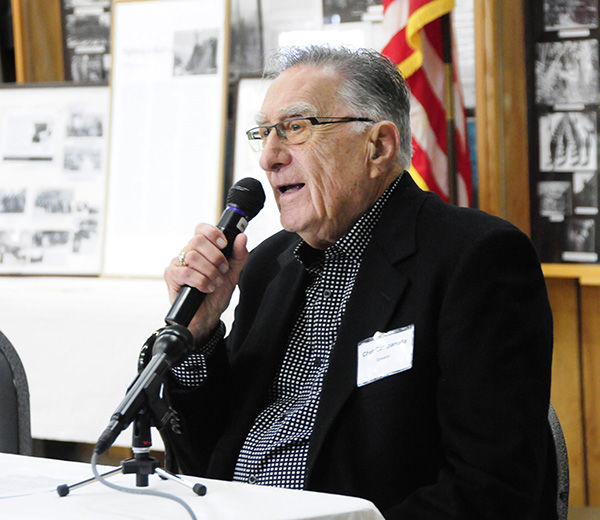
<
While many know about the impact of February 1942’s Executive Order 9066 on Japanese-Americans in the U.S. in response to the bombing of Pearl Harbor, surprisingly few are aware that thousands of Italian-Americans were swept up in the same law that imposed various restrictions including unannounced warrantless searches and even incarceration on certain foreign-born residents. San Jose resident Chet Campanella, 86, was a child when he lived through the imposition of these harsh, discriminatory restrictions. Campanella gave a presentation on the impact of EO 9066 on Italian-Americans in Morgan Hill Feb. 11, at the annual membership meeting of Friends and Family of Nisei Veterans (FFNV). The meeting took place at the Morgan Hill Buddhist Community Center. Sunday, Feb. 19, marked the 75th anniversary of EO 9066. Below is a short version of Campanella’s Feb. 11 presentation.
My parents, uncles, aunts and their Italian friends were among the 600,000 Italian immigrants to the U.S. who had not yet become American naturalized citizens, who were classified as Italian “Enemy Aliens,” and were forced to endure injustices and many mistreatments here in the U.S. during World War Two.
<
I was 12 years old at the time, and having lived through it, I remember these horrible injustices and mistreatments. We were forced to endure curfews, abide by travel restrictions, made to carry booklets that identified us as Italian “Enemy Aliens.” Our homes were searched by the FBI, which was looking for signaling devices. Italian “Enemy Alien” fishermen had their boats confiscated by the Navy. Ten thousand Italians living in coastal communities were forced to board up their homes and to evacuate. Up to 1,000 Italian “Enemy Aliens” were arrested and sent to internment camps.
<
This was classified information for 65 years. Less than 3 percent of our U.S. population know of these happenings.
<
For the past 18 years, I have been trying to get a formal public apology from our government to us survivors for these horrendous happenings, and as of late, also an educational grant for purposes of educating Americans about this aspect of history.
<
In 2010, with the help of Sen. Joseph Simitian, who sponsored SCR 95, I was fortunate enough to get a formal public apology from our state of California.
<
I tried really hard to get a formal public apology and educational grants from our federal government. Last year, our Congressional Representative Zoe Lofgren and I worked together to form two congressional bills. On Dec. 1, 2015, Lofgren introduced H.R. 4146, which asks for a $3 million educational grant to the Educational and Workforce committee of Congress, and H.R. 4147, which asks for a formal public apology to the Judiciary Committee of Congress.
<
Our Congress did not bring bills to the House floor to vote on each of them, but allowed them to die in committee, even though they were well deserved and long overdue.
<
I tried to go to Washington, D.C., and give an oral testimony to the 114th Congress on the subject of the mistreatment of the Italians during World War Two. However, I was told that I could not get permission to do so. Our two bills will be introduced again this year, to the 115th Congress.
<
For more information about FFNV, an organization formed to honor the memory and accomplishments of the 100th/442nd Regimental Combat Team, visit ffnv.org.






